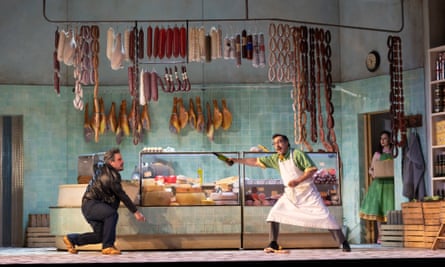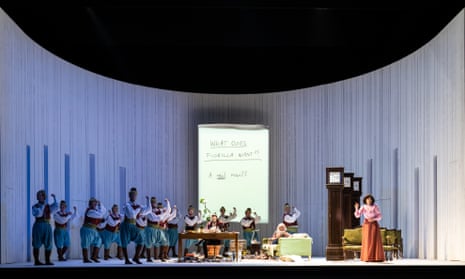Glyndebourne’s second production of the season is a new staging by Mariame Clément of Rossini’s 1814 comedy Il Turco in Italia. Sometimes described as anticipating Pirandello, it deals with an author, Prosdocimo, wandering round Naples in search of characters, and eventually finding material in his observations of the affair between the Turk Selim and the gloriously promiscuous Fiorilla, who is already playing her husband Geronio off against her lover, Narciso, but can always find the time to fit yet another man into her life, somehow.
It’s not, perhaps, a production for purists. Clément plays fast and loose with the basic idea, twisting it round so that the opera becomes a wry depiction of a bestselling novelist’s relationship with his characters, now very much imaginary rather than drawn from life. So we first encounter Prosdocimo (Alessio Arduini) surrounded by adoring fans at a book signing, then follow him to his apartment, where he’s soon pounding away at his typewriter as his characters materialise around him.

They initially prove to be subject to his changes, corrections and rewrites, which we see projected behind him – so when he decides to move his book’s period from the 19th century (“not sexy”) to the 1950s (“neorealist”), Fiorilla (Elena Tsallagova) and Geronio (Rodion Pogossov) are forced to change clothes mid-scene, and Selim (Nahuel di Pierro, looking not unlike Marcello Mastroianni) abandons Ottoman elegance for leather and jeans. Gradually, however, the characters begin engaging with their creator, and by the time we reach Act Two, have effectively developed lives of their own. Prosdocimo’s flat is replaced by the delicatessen that the fictional Geronio runs with Narciso (Michele Angelini) as his assistant, and where Fiorilla throws the fancy-dress party (Covid-secure, a nice touch) that provokes the final crisis in her relationship with her husband.
It’s all wonderfully engaging and very funny, though what ultimately makes the evening so special is the exceptional ensemble cast. Tsallagova is an outstanding Fiorilla, clear-toned, self-assured and coolly manipulative until Pogossov’s put-upon, sympathetic Geronio begins to get fed up: their final duet of reconciliation, as Arduini’s knowing Prosdocimo looks on and comments contentedly, is very much a high point. Di Pierro, meanwhile, makes a charismatic, handsome-sounding Selim, while Angelini is simply spectacular in his two big arias, which Rossini wrote to pacify a star tenor in the original cast.
Sesto Quatrini conducts with considerable élan, and the London Philharmonic play for him with terrific precision. Chasing away the shadows of lockdown, it’s perfect escapism, and quite brilliantly done.

Comments (…)
Sign in or create your Guardian account to join the discussion